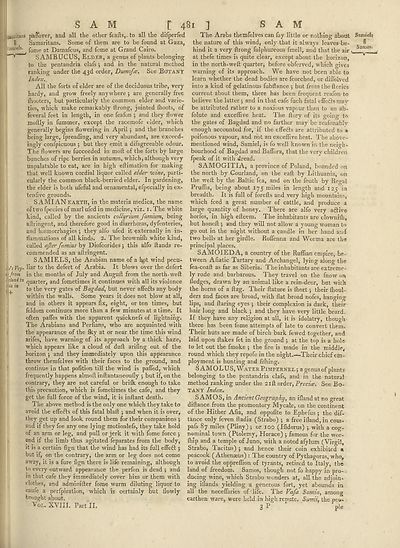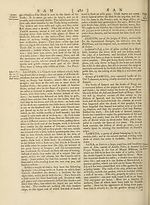Encyclopaedia Britannica, or, a Dictionary of arts, sciences, and miscellaneous literature : enlarged and improved. Illustrated with nearly six hundred engravings > Volume 18, RHI-SCR
(501) Page 481
Download files
Complete book:
Individual page:
Thumbnail gallery: Grid view | List view

§ A M
ojantans pafibver, and all the other feafts,. to all the difperfed
II Samaritans. Some of them are to be found at Gaza,
iiamicls- porne at Damafcus, and fome at Grand Cairo.
SAMBUCUS, Elder, a genus of plants belonging
to the pentandria clafs ) and in the natural method
ranking under the 43d order, Dumofce. See Botany
Index.
All the forts of elder are of the deciduous tribe, very-
hardy, and grow freely anywhere j are generally free
fhooters, but particularly the common elder and varie¬
ties, which make remarkably Itrong, jointed (hoots, of
feveral feet in length, in one feafon ; and they flower
moftly in fummer, except the racemofe elder, which
generally begins flowering in April $ and the branches
being large, fpreading, and very abundant, are exceed¬
ingly confpicuous ; but they emit a difagreeable odour.
The flowers are fucceeded in molt of the forts by large
bunches of ripe berries in autumn, which, although very
Unpalatable to eat, are in high eftimation for making
that well known cordial liquor called elder 'wine, parti¬
cularly the common black-berried elder. In gardening,
the elder is both ufeful and ornamental, efpecially in ex-
tenfive grounds.
SAMIAN earth, in the materia medica, the name
of two fpecies of marl ufed in medicine, viz. i.The white
kind, called by the ancients collyrium famium, being
altringent, and therefore good in diarrhceas, dyfenteries,
and hiemorrhagies j they alfo ufed it externally in in¬
flammations of all kinds. 2. The brownilh white kind,
called ajlcr famius by Diofcorides j this alfo (lands re¬
commended as an aftringent.
SAMIELS, the Arabian name of a hot wind pecu-
j-L-V Voy- liar to the defert of Arabia. It blows over the defert
4from in the months of July and Auguft; from the north-weft
quarter, and fometimes it continues with all its violence
to the very gates of Bagdad, but never affedls any body
within the walls. Some years it does not blow at all,
and in others it appears fix, eight, or ten times, but
feldom continues more than a few minutes at a time* It
often palfes with the apparent quicknefs of lightning*
The Arabians and Perfians, ■who are acquainted with
the appearance of the (ky at or near the time this wind
arifes, have warning of its approach by a thick haze,
which appears like a cloud of dull arifing out of the
horizon *, and they immediately upon this appearance
throw themfelves with their faces to the ground, and
continue in that pofition till the wind is pafled, which
frequently happens almoft inftantaneoufly j but if, on the
contrary, they are not careful or brilk enough to take
this precaution, which is fometimes the cafe, and they
get the full force of the wind, it is inftant death.
The above method is the only one which they take to
avoid the effefls of this fatal blaft •, and when it is over,
they get up and look round them for their companions $
and if they fee any one lying motionlefs, they take hold
of an arm or leg, and pull or jerk it with fome force j
and if the limb thus agitated feparates from the body,
it is a certain fign that the wind has had its full effedl 5
but if, on the contrary, the arm or leg does not come
away, it is a fure fign there is life remaining, although
to every outuTard appearance the perfon is dead ; and
m that cafe they immediately cover him or them with
clothes, and adminifter fome warm diluting liquor to
caufe a perfpiration, which is certainly but (lowly
brought about.
Vol. XVIII. Part'll.
Samo?i
dani to
ia in
4-
t 481 ] SAM
The Arabs themfelves can fay little or nothing about Samiels
the nature of this wind, only that it always leaves be¬
hind it a very ftrong fulphureous finell, and that the air 1
at thefe times is quite clear, except about the horizon,
in the north-weft quarter, before obferved, which gives
warning of its approach. We have not been able to
learn whether the dead bodies are fcorched, or diflblved
into a kind of gelatinous fubftance ; but from the (lories
current about them, there has been frequent reafon to
believe the latter 5 and in that cafe fuch fatal effedls may¬
be attributed rather to a noxious vapour than to an ab-
folute and exceflive heat. The (lory of its going to
the gates of Bagdad and no farther may be reafonablv
enough accounted for, if the effefts are attributed to a
poifonous vapour, and not an exceflive heat. The above-
mentioned wind, Samiel, is fo well known in the neigh¬
bourhood of Bagdad and Baflbra, that the very children
fpeak of it with dread.
SAMOGITIA, a province of Poland, bounded on
the north by Courland, on the eaft by Lithuania, on
the w'eft by the Baltic fea, and on the fouth by Regal
Pruflia, being about 175 miles in length and 125 in
breadth. It is full of forefts and very high mountains,
which feed a great number of cattle, and produce a
large quantity of honey. There are alfo very adtive
horfes, in high efteem. The inhabitants are elownith,
but honed ; and they will not allow a young woman to
go out in the night without a candle in her hand and
two bells at her girdle. Rolfenna and Worma are the
principal places*
SAMOIEDA, a country of the Ruffian empire, be¬
tween Afiatic Tartary and Archangel, lying along the
fea-coaft as far as Siberia. The inhabitants are extreme¬
ly rude and barbarous. They travel on the fnow on
fledges, drawn by an animal like a rein-deer, but with
the horns of a (lag. Their ftature is (hort; their (boul¬
ders and faces are broad, with flat broad nofes, hanging
lips, and daring eyes j their complexion is dark, their
hair long and black ; and they have very little beard..
If they have any religion at all, it is idolatry, though
there has been fome attempts of late to convert them.
Their huts are made of birch bark fewed together, and
laid upon (lakes fet in the ground ; at the top is a hole
to let out the fmoke ; the fire is made in the middle,
round which they repofe in the night.—Their chief em¬
ployment is hunting and fifliing.
SAMOLUS, Water Pimpernel-, a genus of plants
belonging to the pentandria clafs, and in the natural
method ranking under the 2lft order, Precice. See Bo¬
tany Index.
SAMOS, in Ancient Geography, an ifland at no great
diftance from the promontory Mycale, on the continent
of the Hither Afia, and oppofite to Epbefus ; the dif¬
tance only feven (ladia (Strabo) ; a free ifland, in com-
pafs 87 miles (Pliny) ; or 100 (Ifidorus) ; with a cog-
nominal town (Ptolemy, Horace) j famous for the wor-
fliip and a temple of Juno, with a noted afylum (Virgil,
Strabo, Tacitus) j and hence their coin exhibited a
peacock (Athenaeus) : The country of Pythagoras, who,
to avoid the oppreflion of tyrants, retired to Italy, the
land of freedom. Samos, though not fo happy in pro-.
ducing wine, which Strabo wonders at, all the adjoin¬
ing iflands yielding a generous fort, yet abounds in
all the neceffaries of life. The Vafa Samia, among
earthen ware, were held in high repute. Samii, the peo-
3 P nit
pie
ojantans pafibver, and all the other feafts,. to all the difperfed
II Samaritans. Some of them are to be found at Gaza,
iiamicls- porne at Damafcus, and fome at Grand Cairo.
SAMBUCUS, Elder, a genus of plants belonging
to the pentandria clafs ) and in the natural method
ranking under the 43d order, Dumofce. See Botany
Index.
All the forts of elder are of the deciduous tribe, very-
hardy, and grow freely anywhere j are generally free
fhooters, but particularly the common elder and varie¬
ties, which make remarkably Itrong, jointed (hoots, of
feveral feet in length, in one feafon ; and they flower
moftly in fummer, except the racemofe elder, which
generally begins flowering in April $ and the branches
being large, fpreading, and very abundant, are exceed¬
ingly confpicuous ; but they emit a difagreeable odour.
The flowers are fucceeded in molt of the forts by large
bunches of ripe berries in autumn, which, although very
Unpalatable to eat, are in high eftimation for making
that well known cordial liquor called elder 'wine, parti¬
cularly the common black-berried elder. In gardening,
the elder is both ufeful and ornamental, efpecially in ex-
tenfive grounds.
SAMIAN earth, in the materia medica, the name
of two fpecies of marl ufed in medicine, viz. i.The white
kind, called by the ancients collyrium famium, being
altringent, and therefore good in diarrhceas, dyfenteries,
and hiemorrhagies j they alfo ufed it externally in in¬
flammations of all kinds. 2. The brownilh white kind,
called ajlcr famius by Diofcorides j this alfo (lands re¬
commended as an aftringent.
SAMIELS, the Arabian name of a hot wind pecu-
j-L-V Voy- liar to the defert of Arabia. It blows over the defert
4from in the months of July and Auguft; from the north-weft
quarter, and fometimes it continues with all its violence
to the very gates of Bagdad, but never affedls any body
within the walls. Some years it does not blow at all,
and in others it appears fix, eight, or ten times, but
feldom continues more than a few minutes at a time* It
often palfes with the apparent quicknefs of lightning*
The Arabians and Perfians, ■who are acquainted with
the appearance of the (ky at or near the time this wind
arifes, have warning of its approach by a thick haze,
which appears like a cloud of dull arifing out of the
horizon *, and they immediately upon this appearance
throw themfelves with their faces to the ground, and
continue in that pofition till the wind is pafled, which
frequently happens almoft inftantaneoufly j but if, on the
contrary, they are not careful or brilk enough to take
this precaution, which is fometimes the cafe, and they
get the full force of the wind, it is inftant death.
The above method is the only one which they take to
avoid the effefls of this fatal blaft •, and when it is over,
they get up and look round them for their companions $
and if they fee any one lying motionlefs, they take hold
of an arm or leg, and pull or jerk it with fome force j
and if the limb thus agitated feparates from the body,
it is a certain fign that the wind has had its full effedl 5
but if, on the contrary, the arm or leg does not come
away, it is a fure fign there is life remaining, although
to every outuTard appearance the perfon is dead ; and
m that cafe they immediately cover him or them with
clothes, and adminifter fome warm diluting liquor to
caufe a perfpiration, which is certainly but (lowly
brought about.
Vol. XVIII. Part'll.
Samo?i
dani to
ia in
4-
t 481 ] SAM
The Arabs themfelves can fay little or nothing about Samiels
the nature of this wind, only that it always leaves be¬
hind it a very ftrong fulphureous finell, and that the air 1
at thefe times is quite clear, except about the horizon,
in the north-weft quarter, before obferved, which gives
warning of its approach. We have not been able to
learn whether the dead bodies are fcorched, or diflblved
into a kind of gelatinous fubftance ; but from the (lories
current about them, there has been frequent reafon to
believe the latter 5 and in that cafe fuch fatal effedls may¬
be attributed rather to a noxious vapour than to an ab-
folute and exceflive heat. The (lory of its going to
the gates of Bagdad and no farther may be reafonablv
enough accounted for, if the effefts are attributed to a
poifonous vapour, and not an exceflive heat. The above-
mentioned wind, Samiel, is fo well known in the neigh¬
bourhood of Bagdad and Baflbra, that the very children
fpeak of it with dread.
SAMOGITIA, a province of Poland, bounded on
the north by Courland, on the eaft by Lithuania, on
the w'eft by the Baltic fea, and on the fouth by Regal
Pruflia, being about 175 miles in length and 125 in
breadth. It is full of forefts and very high mountains,
which feed a great number of cattle, and produce a
large quantity of honey. There are alfo very adtive
horfes, in high efteem. The inhabitants are elownith,
but honed ; and they will not allow a young woman to
go out in the night without a candle in her hand and
two bells at her girdle. Rolfenna and Worma are the
principal places*
SAMOIEDA, a country of the Ruffian empire, be¬
tween Afiatic Tartary and Archangel, lying along the
fea-coaft as far as Siberia. The inhabitants are extreme¬
ly rude and barbarous. They travel on the fnow on
fledges, drawn by an animal like a rein-deer, but with
the horns of a (lag. Their ftature is (hort; their (boul¬
ders and faces are broad, with flat broad nofes, hanging
lips, and daring eyes j their complexion is dark, their
hair long and black ; and they have very little beard..
If they have any religion at all, it is idolatry, though
there has been fome attempts of late to convert them.
Their huts are made of birch bark fewed together, and
laid upon (lakes fet in the ground ; at the top is a hole
to let out the fmoke ; the fire is made in the middle,
round which they repofe in the night.—Their chief em¬
ployment is hunting and fifliing.
SAMOLUS, Water Pimpernel-, a genus of plants
belonging to the pentandria clafs, and in the natural
method ranking under the 2lft order, Precice. See Bo¬
tany Index.
SAMOS, in Ancient Geography, an ifland at no great
diftance from the promontory Mycale, on the continent
of the Hither Afia, and oppofite to Epbefus ; the dif¬
tance only feven (ladia (Strabo) ; a free ifland, in com-
pafs 87 miles (Pliny) ; or 100 (Ifidorus) ; with a cog-
nominal town (Ptolemy, Horace) j famous for the wor-
fliip and a temple of Juno, with a noted afylum (Virgil,
Strabo, Tacitus) j and hence their coin exhibited a
peacock (Athenaeus) : The country of Pythagoras, who,
to avoid the oppreflion of tyrants, retired to Italy, the
land of freedom. Samos, though not fo happy in pro-.
ducing wine, which Strabo wonders at, all the adjoin¬
ing iflands yielding a generous fort, yet abounds in
all the neceffaries of life. The Vafa Samia, among
earthen ware, were held in high repute. Samii, the peo-
3 P nit
pie
Set display mode to:
![]() Universal Viewer |
Universal Viewer | ![]() Mirador |
Large image | Transcription
Mirador |
Large image | Transcription
Images and transcriptions on this page, including medium image downloads, may be used under the Creative Commons Attribution 4.0 International Licence unless otherwise stated. ![]()
| Permanent URL | https://digital.nls.uk/193025220 |
|---|
| Attribution and copyright: |
|
|---|
| Description | Ten editions of 'Encyclopaedia Britannica', issued from 1768-1903, in 231 volumes. Originally issued in 100 weekly parts (3 volumes) between 1768 and 1771 by publishers: Colin Macfarquhar and Andrew Bell (Edinburgh); editor: William Smellie: engraver: Andrew Bell. Expanded editions in the 19th century featured more volumes and contributions from leading experts in their fields. Managed and published in Edinburgh up to the 9th edition (25 volumes, from 1875-1889); the 10th edition (1902-1903) re-issued the 9th edition, with 11 supplementary volumes. |
|---|---|
| Additional NLS resources: |
|

